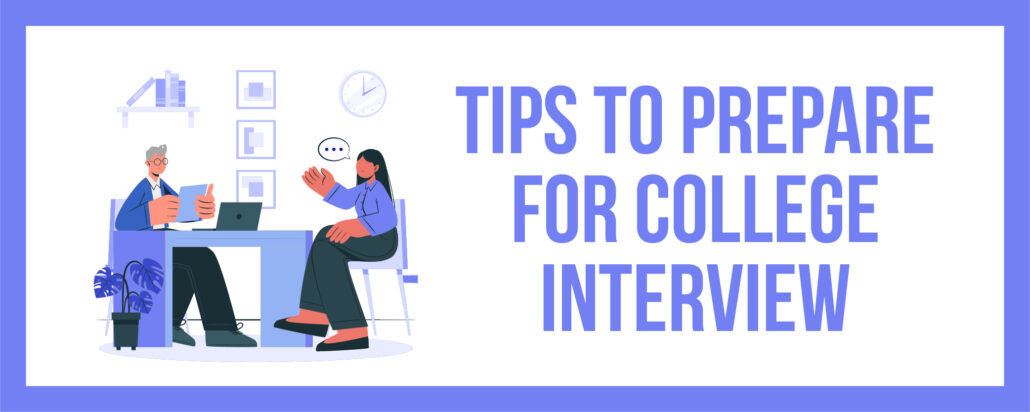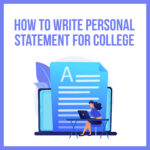
Even the most confident people get a little nervous during an interview. College interviews can be especially nerve-wracking, especially if you don’t have a lot of formal interview experience.
But college interviews don’t have to be a nightmare. In fact, they are a great opportunity to demonstrate your interest and stand out among other applicants. Admissions representatives and interviewers want to get to know you; listening to you answer interview questions is a good way to do that.
This blog post will discuss everything high school students (and graduate school hopefuls) need to know to ace a college interview.
How Important Are College Admissions Interviews?

The college interview is an essential part of the admissions process, as it helps admissions committees learn more about applicants beyond their application materials. In addition, it’s an opportunity for you to demonstrate your interest in the college and academic program, highlight your strengths, and showcase your personality.
A good interview can also help to offset lower test scores or grades. So if your college application is less than stellar, your admissions interview can help you win your college interviewers over. Similarly, it can allow you to clarify things about your background or experience that weren’t fully explained elsewhere in the college application process.
Preparing for Your College Interview
Preparing for your college interview ahead of time is key to a successful interview. Here are some tips for college campus interviews that can help you put your best foot forward.
Researching the College and Its Values

Before your interview, it’s important to research the college and its values. You’ll also be doing this during your college essay process, so you should be somewhat familiar with this information. This will help you to demonstrate interest in the school on interview day.
But where do you find this info?
Look on the college website, and read about their values and missions, academic programs, campus life, and extracurricular activities.
You can also use it to craft your own questions to ask the admissions officer conducting your interview.
Understanding the Interview Format
The interview format can vary depending on the college and interviewer. It could be an in-person interview, a virtual interview, or even a phone interview. Make sure to confirm the interview location and format ahead of time. You can do this by reaching out to the admissions office.
Knowing the Common Interviewer Questions
Researching common interview questions will help you prepare and practice responses. Some common college interview questions include:
- Tell me about yourself.
- Why did you choose this college?
- What are your academic and career goals?
- What are your strengths and weaknesses?
- How do you handle challenges?
Practicing Your Responses
Practice answering interview questions with a family member or college counselor. Make mental notes of your strengths and weaknesses, and think about how you can best demonstrate your qualifications for admission as you answer questions.
Conducting a Mock Interview

You could also conduct a mock interview with a college counselor or family member. This will help you get a feel for the interview process and practice your responses in a simulated interview setting. Although it won’t be exactly the same as being on campus, it can help you prepare for your interview with an admissions team and double check your interview readiness.
Dressing for Success
Dressing appropriately for your college interview is important to make a good first impression. You have to remember that what is in style and appropriate for a high school setting isn’t necessarily adequate for meeting with college counselors or college interviewers. Here are some more tips on how to dress for success:
When in Doubt, Dress Conservatively
Dress professionally and conservatively. For men, this could be a suit and tie or dress pants and a button-up shirt. For women, a blouse and dress pants or a dress that covers well would be appropriate.
Dressing appropriately shows that you take the interview seriously and are respectful of the interviewer’s time. It also demonstrates your professionalism and attention to detail.
Things to Avoid
Avoid wearing anything too casual or revealing. Avoid flashy jewelry, strong fragrances, and distracting accessories. You want your interview answers to get the attention, not your clothing, hair, jewelry, or makeup.
Get Creative
Lots of those looking for an outfit as a preparation for a college interview are on a tight budget. Businessware can be expensive, but you don’t have to spend a lot to impress. You can try local thrift stores or resale shops like Goodwill. Many department stores like JCPenney have student days when you can “Suit Up” for a discounted price. And don’t be afraid to borrow from someone you know or community members. There are plenty of people who love to help first-year applicants prepare!
Nailing the First Impression

Making a good first impression is crucial in the interview process. There are a few things you can do to ensure that you ace your interview from the very start.
- Arrive early at the interview location. This will give you time to find parking, locate the building, and get settled before the interview.
- Make an effort to establish a connection with your interviewer. Smile and be friendly, and try to find common ground. This can help to ease any nervousness and set a positive tone for the interview.
- Make sure to project confidence, professionalism, and enthusiasm. Remember, the interviewer is looking for someone who will contribute positively to the college community. If you don’t feel confident, fake it until you make it.
Body Language and Communication
Body language and communication are important aspects of the interview process. Here are some tips on how to use body language and communicate effectively.
Body language can communicate a lot about your attitude and personality. Make sure to maintain eye contact and use open, confident gestures.
Sit up straight and maintain good posture. Avoid fidgeting or crossing your arms.
Speak clearly and confidently. Use specific examples to illustrate your points and maintain a positive attitude.
Handling Tough Questions
Handling tough questions can be challenging, but you can learn to respond with confidence and grace with practice. Here are some tips on handling tough questions:
- Take a deep breath and pause before answering. If you don’t know the answer, admitting it and offering to follow up later is okay.
- If you don’t know the answer, ask for clarification or ask for more information about the question.
- Try to stay focused and calm, even if you don’t know all of the right answers. Remember that the interviewer is looking for someone who can handle pressure and stay composed.
Asking Intelligent Questions
Asking questions during the interview is an excellent way to demonstrate your interest in the college and learn more about the school.
Examples of Good Questions to Ask
Ask about campus life, academic programs, or the college’s culture. You can also ask about the interviewer’s personal experience at the school.
What to Avoid Asking
Avoid asking questions that can be easily answered by researching the college’s website. Also, avoid asking questions that are too personal or inappropriate.
Following Up After Your College Interview
Following up after your interview is a great way to demonstrate your interest in the college and thank the interviewer for their time. Here are some tips on how to follow up after your interview:
Why Following Up is Important
Following up shows that you appreciate the interviewer’s time and are genuinely interested in the college. It also gives you the opportunity to clarify any points you may have missed during the interview.
How to Follow Up After Your Interview
Send a thank-you note or email to the interviewer within 24 hours of the interview. Thank them for their time, reiterate your interest in the college, and highlight any key points from the interview.
What to Say in Your Follow-up Email
In your follow-up email, make sure to express your gratitude for the opportunity to interview with the college. Be specific about what you enjoyed and learned during the interview, and reiterate your interest in the college.
Where to Get Help for Your College Interview
If you’re feeling overwhelmed or nervous about your college interview, don’t worry! There are many resources available to help you prepare.
College admissions consultants can provide one-on-one coaching and guidance to help you navigate the interview process. They can help you develop your interview skills, practice responses to common interview questions, and build your confidence.
Additionally, your high school’s college counseling office may offer mock interviews or other resources to help you prepare. Don’t hesitate to reach out for help if you need it – preparing for your college interview can make all the difference in your admissions process.
Ace Your College Interview With Help From Admission Consultants
Conclusion
The college interview can be a daunting experience, but with preparation and practice, you can ace your interview and stand out among other applicants. Remember to be yourself, stay confident, and demonstrate your interest in the college. Good luck!
FAQs
Types of college interviews can vary, including in-person, virtual, or phone interviews.
It’s a good idea to bring a copy of your resume and a pen and paper to take notes to your college interview.
When introducing yourself in a college interview, make sure to be polite, confident, and professional.
College interviews can range from 30 minutes to an hour or more.
Yes, it’s a good idea to send a thank-you note or email within 24 hours of the interview to express your gratitude and reiterate your interest in the college.
Prepare for each interview individually and keep track of interview dates and locations to avoid scheduling conflicts.
Your college interview may be conducted by an admissions representative or college interviewer.
To prepare for a virtual college interview, make sure you have a reliable internet connection, a quiet and well-lit space, and test your technology ahead of time.
If you don’t have much experience with interviews, practice with a college counselor or family member and conduct mock interviews to build your confidence.
Yes, it’s okay to ask for feedback on your interview after it’s over to help improve your future interview skills.
If you don’t get accepted to the college after your interview, take it as an opportunity to reflect on your interview performance and consider other options.
Bryce Welker is an active speaker, blogger, and regular contributor to Forbes, Inc.com, and Business.com where he shares his knowledge to help others boost their careers. Bryce is the founder of more than 20 test prep websites that help students and professionals pass their certification exams.












